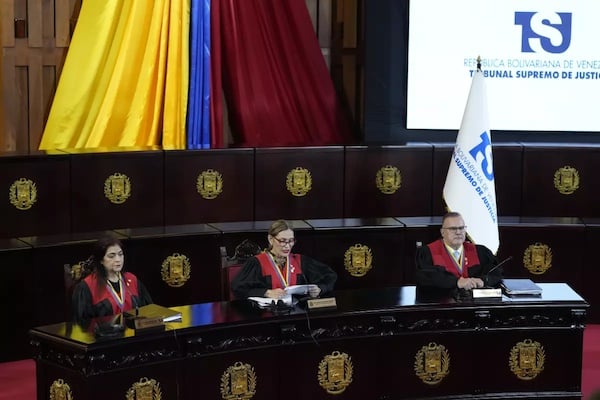The Venezuelan Supreme Court (TSJ) has concluded its review of the July 28 presidential elections in the Caribbean country.
On Thursday, Venezuela’s maximum judicial authority ratified President Nicolás Maduro’s victory to secure a third term that will run from January 10, 2025, to January 10, 2031.
In a press conference with state officials, diplomatic representatives and reporters, TSJ President Caryslia Rodríguez began by reaffirming the court’s jurisdiction and recalling recent electoral processes in Brazil, Mexico and the United States that were ultimately settled by judicial rulings. The magistrate then proceeded to read the verdict.
“We certify in an unobjectionable way that the examined electoral evidence confirms the results proclaimed by the National Electoral Council (CNE) which saw Nicolás Maduro reelected as president,” she said.
The CNE declared Maduro the winner with 52 percent of the vote, compared to 43 percent for U.S.-backed opposition candidate Edmundo González.
Rodríguez stated that a team of national and international experts had conducted a review “with the highest technical standards” of the voting records submitted by electoral parties and candidates and found them to “fully coincide” with data from the CNE’s tallying centers.
The TSJ president, who also heads the body’s electoral branch, additionally stressed that the CNE should publish the “definitive results” in the National Gazette before an August 28 deadline. Venezuela’s electoral authority has not published detailed results broken down by voting center, with officials denouncing massive cyberattacks against state infrastructure.
On July 31, Venezuelan President Nicolás Maduro requested that the CNE’s electoral branch intervene following fraud claims and violent unrest in the days after the vote.
Rodríguez declared that the CNE submitted electoral evidence as required, as did most political parties and candidates that took part in the July 28 contest. Two of the former presidential hopefuls, Enrique Márquez and Antonio Ecarri, did not deliver voting tallies. Both went on to introduce appeals before the TSJ, with Márquez calling for the TSJ president to recuse herself over alleged political biases and Ecarri requesting that the court’s constitutional branch clarify the respective responsibilities of the electoral branch and the CNE.
In delivering the final ruling, which is not appealable, Rodríguez recalled that hardline candidate González was in contempt of court for not appearing as summoned and not consigning the requested evidence. She urged Attorney General Tarek William Saab to launch investigations for crimes including usurpation of functions, document forgery and digital infractions.
Thursday’s verdict was welcomed by government officials, with Foreign Minister Yván Gil saying that the ruling “turns the page” on the elections and that the country is “at peace.” For his part, Defense Minister Vladimir Padrino praised Venezuela’s institutions for “fulfilling their role.”
On Wednesday, González and far-right political leader María Corina Machado issued a joint statement arguing that the Supreme Court holds no competency to validate electoral results and demanding that the CNE comply with their claims that González was the victor by a landslide. His campaign team set up a website showing purported voting tallies, though the authenticity of the uploaded documents has been called into question.
Machado and González went on to vow that the latter will take office as president next January.
The hardline U.S.-backed opposition has reiteratedly refused to recognize electoral defeats over the past two decades, often spurring violent street protests in response. In recent weeks, U.S. officials have voiced support for González’s claim and emphasized the need for a “transition” in the Latin American country.
On Thursday, U.S. Senators including Rick Scott (R-FL) and Jim Risch (R-ID) announced the so-called VALOR Act to “promote democracy” in Venezuela. The legislation includes an emphasis on economic sanctions against the Caribbean nation.
The Maduro government has repeatedly rejected foreign meddling and attacks on Venezuelan sovereignty. It has denounced a US-led coup attempt following the latest election. Caracas suspended diplomatic relations with Argentina, Chile, Costa Rica, Panama, Peru and the Dominican Republic earlier this month, accusing the respective governments of being “subordinated to Washington” and interfering in internal Venezuelan affairs.
The Venezuelan Foreign Ministry has likewise rejected a UN expert panel report on the July 28 vote due to “perverse political intentions” and for breaking the terms agreed to with the CNE. The four-person UN team claimed the lack of detailed results generated a “negative impact on confidence in the outcome” and also pointed to the suspension of post-electoral audits.
Caracas had previously taken aim at “blatant lies” by the Carter Center’s observation mission. In contrast, a series of other international accompaniment teams endorsed the Venezuelan electoral process. A delegation from the U.S.’ National Lawyers Guild (NLG) issued a statement affirming that its members “witnessed no instances of fraud or serious irregularities and found overall voter satisfaction with the electoral process.”

